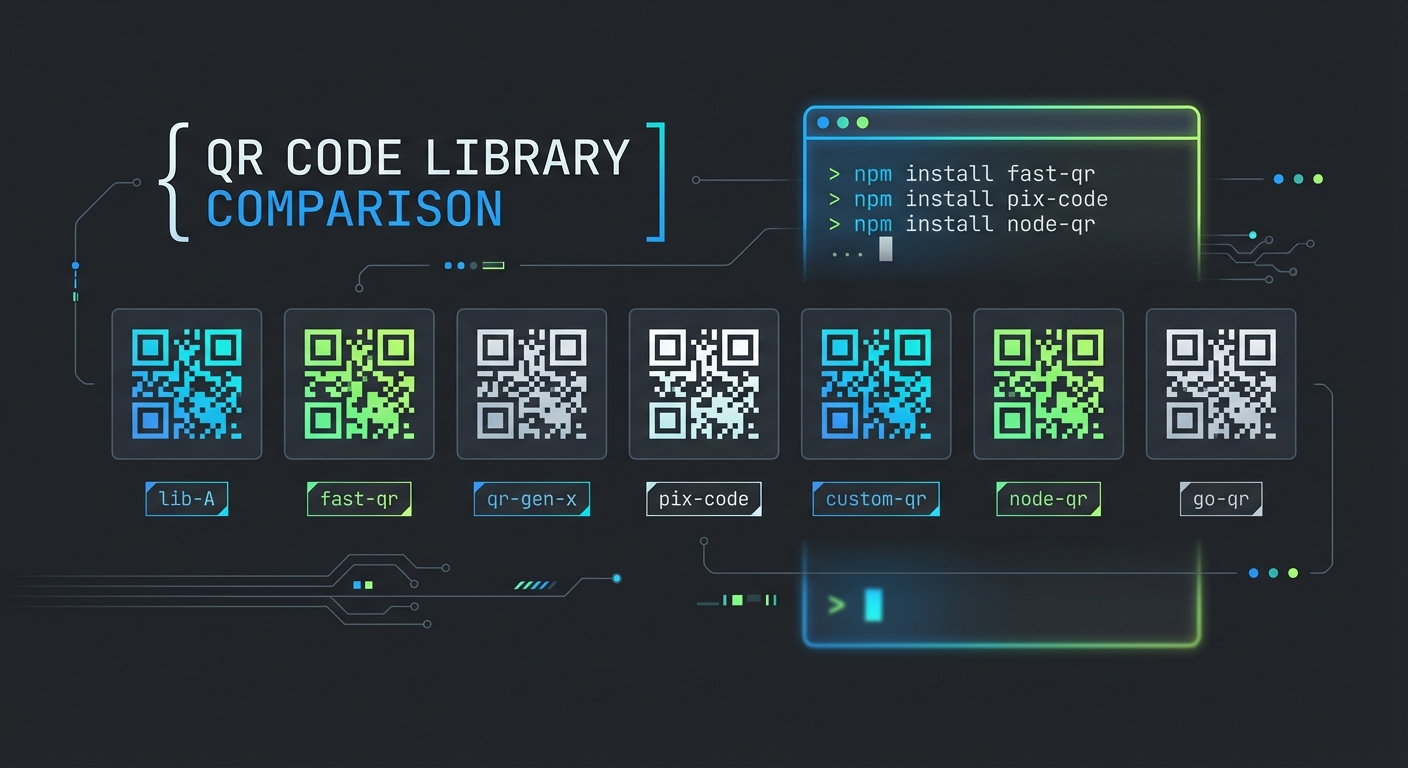2025年开发者的7个最佳二维码库

2025年开发者的7个最佳二维码库
找到合适的二维码库可以节省您数小时的开发时间。在测试了不同平台上的数十个库之后,我整理了这份当今最佳选择列表。无论您需要简单生成还是高级样式功能,这里都有适合您项目的完美解决方案。
快速比较
在深入细节之前,这里是每个库的独特之处:
| 库 | 最适合 | 样式选项 | 性能 |
|---|---|---|---|
| QRCode.js | 简单web应用 | 基础 | 优秀 |
| ZXing | 移动应用 | 有限 | 良好 |
| QR Code Styling | 精美二维码 | 高级 | 很好 |
| Nayuki QR | 多语言 | 基础 | 优秀 |
| python-qrcode | Python项目 | 中等 | 良好 |
| QR Server | API集成 | 基础 | N/A |
| qrcodegen | 底层控制 | 无 | 优秀 |
1. QRCode.js - 经典之选
QRCode.js仍然是web应用中直接进行二维码生成的首选库。拥有超过12,000个GitHub星标,它久经考验且可靠。
主要特性:
- 零依赖
- Canvas和表格渲染
- TypeScript支持
- 压缩后4KB大小
- 跨浏览器兼容性
最适合: 需要快速生成二维码而无需花哨样式的简单web应用。
局限性: 没有内置logo支持,自定义选项有限,没有SVG输出。
2. ZXing - 移动应用利器
如果您正在构建移动应用,ZXing(“斑马线”)就是您的瑞士军刀。最初由Google开发,它可以跨多个平台处理二维码生成和扫描。
主要特性:
- 多格式条码支持
- Android和iOS SDK
- 扫描功能
- 详尽文档
- 活跃社区
最适合: 需要生成和扫描功能的移动开发者。
局限性: 对于简单web项目过于复杂,学习曲线较陡。
3. QR Code Styling - 设计师的梦想
QR Code Styling将无聊的二维码转变为品牌体验。我们在QRCode.Fun使用这个库,因为它具有令人难以置信的灵活性和现代化的二维码设计方法。
主要特性:
- 带自动纠错的logo集成
- 渐变支持和自定义形状
- 多种导出格式(PNG、JPEG、WebP、SVG)
- Canvas和SVG渲染
- TypeScript优先
- 广泛的样式API
最适合: 营销活动、品牌二维码和需要视觉吸引力的项目。
我们喜欢它的原因: 定制化和可靠性之间的平衡是完美的。您可以创建出色的二维码,并且实际上可以持续扫描。
4. Nayuki QR Code Generator - 多语言专家
Nayuki的二维码生成器提供六种编程语言的实现,具有相同的API。当您需要跨不同技术栈保持一致性时,它是首选库。
主要特性:
- 可用于Java、TypeScript、Python、Rust、C++和C
- 数学上最优编码
- 全面文档
- MIT许可证
- 占用空间小
最适合: 需要多语言实现的项目或教育目的。
局限性: 基本样式选项,没有内置logo支持。
5. python-qrcode - Python解决方案
对于Python开发者,python-qrcode为二维码生成提供了干净的Python式接口。拥有超过4,000个GitHub星标,它是最受欢迎的Python解决方案。
主要特性:
- PIL/Pillow集成
- SVG输出支持
- 自定义图像工厂
- 命令行接口
- 广泛定制
最适合: Python web应用、数据科学项目和自动化脚本。
权衡: 仅限Python,需要图像处理库。
6. QR Server - API方式
有时您根本不需要库。QR Server提供了一个简单的API来生成二维码,无需任何安装。
主要特性:
- REST API访问
- 无需安装
- 多种输出格式
- 基于URL的参数
- 提供免费套餐
最适合: 快速原型、无服务器应用和二维码需求最少的项目。
考虑因素: 外部依赖、潜在延迟、定制有限。
7. qrcodegen - 性能之王
当每毫秒都很重要时,qrcodegen通过其优化的C实现和多语言绑定提供无与伦比的性能。
主要特性:
- 最快生成速度
- 最小内存使用
- C核心与语言绑定
- 无外部依赖
- 全面测试套件
最适合: 高性能应用、嵌入式系统和批处理。
权衡: 没有样式选项,需要更多设置。
做出正确选择
选择完美的二维码库取决于您的具体需求:
选择QRCode.js如果您需要web应用的简单轻量级解决方案。
选择ZXing如果您正在构建具有扫描要求的移动应用。
选择QR Code Styling如果视觉吸引力和品牌是优先事项。
选择Nayuki如果您需要跨多种语言的一致实现。
选择python-qrcode如果您在Python生态系统中工作。
选择QR Server如果您想完全避免依赖。
选择qrcodegen如果性能是您的首要任务。
实施技巧
在数十个项目中实施二维码后,以下是我的最佳建议:
- 始终使用多个扫描器测试 - 在一个应用中有效的可能在另一个应用中失败
- 添加logo或样式时保持30%纠错
- 对印刷材料使用矢量格式(SVG)
- 保持URL简短 - 考虑对复杂链接使用URL缩短器
- 在真实条件下测试 - 不同的光线和角度会影响扫描
结论
2025年的二维码库格局为每个人提供了选择。虽然QRCode.js仍然是简单的标准,但QR Code Styling等库正在通过高级定制推动界限。我们发现,将正确的库与适当的实施实践相结合,可以创建既美观又实用的二维码。
对于大多数web项目,我建议从QR Code Styling开始,因为它在功能和易用性之间取得了平衡。这就是我们在QRCode.Fun的二维码生成器的动力来源,允许用户创建令人惊叹的品牌二维码,同时保持出色的扫描率。
您对二维码库的体验如何?您发现了什么隐藏的珍宝吗?在评论中告诉我们,或尝试我们的生成器来查看这些库的实际应用。